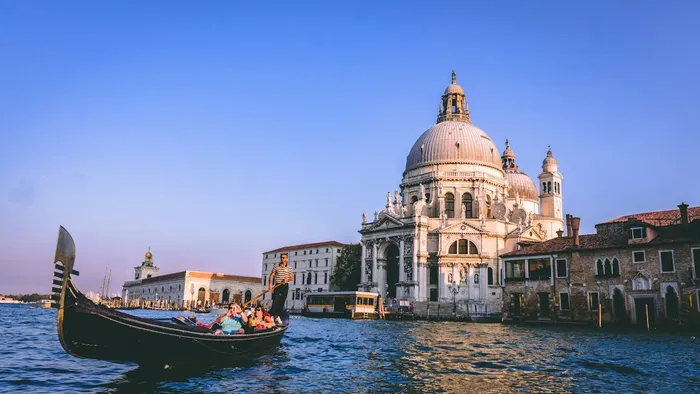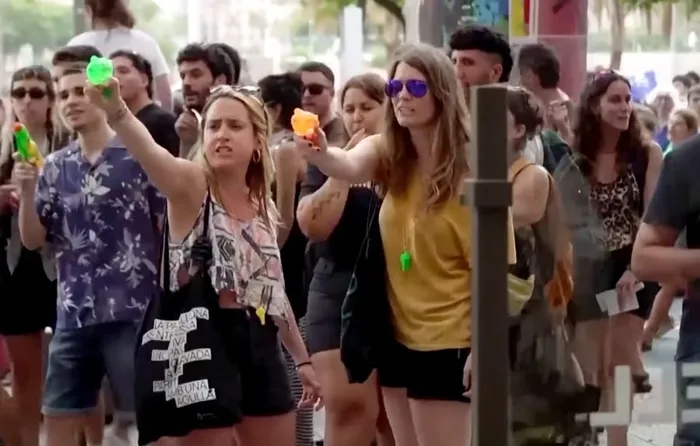
Venice is a popular tourist trap, but now locals are demanding restrictions on the number of day visitors swarming into the lagoon city.
Image: Pexels
Brandishing water pistols and banners that scream "Tourists go home!", locals in a number of European cities are on the warpath against unchecked rentals and overtourism that is drastically changing their way of life.
Whether it is the ancient streets of Barcelona in Spain or the crowded waterways of Venice, locals are turning up the heat on their governments to do something about the burgeoning tourism industry that is making life unbearable.
Even Cape Town residents are feeling the pinch, with rentals skyrocketing, in part due to digital nomads being happy to pay inflated rent because they are paid in foreign currencies.

Barcelona residents use water pistols on visitors during a wave of anti-tourism protests as residents express growing frustration with how overtourism has affected their city.
Image: Streengrab
Citizens of these magical tourist spots bring to mind the fable of the farmer whose goose laid a golden egg. Driven by greed, he killed the goose in the hope of finding a clutch of golden eggs, but found nothing.
The moral of the fable is that short-sightedness and greed can lead to the destruction of a valuable resource.
The complicated relationship between citizens of tourist hotspots and the ever-increasing number of tourists flooding in requires a measured response that ensures that both groups are accommodated.
In Madrid, locals have turned water pistols on tourists, brandished banners shouting "Tourists go home!" to be heard against the backdrop of mass tourism that has significantly changed their way of life.
Overtourism
Stephen Burgen, a Barcelona resident, recently penned an opinion piece in "The Guardian" detailing an incident where locals squirted at tourists visiting the Sagrada Familia. He anticipates similar reactions in Mallorca, the Canary Islands, and Málaga as residents prepare for another season of overtourism.
Burgen said the country received close to 100 million visitors last year, which is twice the population - good news for those with vested interests in the tourism industry.
"But those of us with no stake in the hospitality trade brace ourselves for the invasion with a mixture of dread and resentment. For those on the receiving end, mass tourism feels more and more extractive to the point that it is a form of corporate colonialism," he lamented.
But it is not just the numbers that distress locals: it is the pressure they place on water and sanitation infrastructure, the environment and the detrimental effect they have on the intrinsic nature of each tourist hotspot.
Social justice concerns have also been raised by protesters who argue that the economic boosts brought to these cities are not shared equitably and that big businesses make profits at the expense of local communities.
A tourism tax is being explored by many countries and has already been applied in Greece, while Durban Tourism has also mulled the idea.
Sustainable solutions
In another opinion piece in "The Guardian", Leah Pattem argued that visitors could be more sensitive, while the authorities should seek sustainable solutions for residents and tourists.
"For the most part, protesters are calling for a total overhaul of a model of tourism that, they argue, drives up housing costs, harms the environment and creates low-paid, unstable jobs – while concentrating profits in the hands of a few," she wrote, citing her own experience living in Lavapiés, a once vibrant and multicultural neighbourhood near Madrid’s main train station.
"Lavapiés has one of the highest concentrations of unlicensed tourist rentals in Madrid. These small flats, originally built in the 18th and 19th centuries to house the city’s growing industrial workforce, remained affordable for centuries.
"Now, thousands of such flats are listed on Airbnb at rates rivalling those in the city’s wealthiest neighbourhoods," she wrote.
Finding middle ground
Pattem says this pushback is not the death knell of the golden age of tourism, but rather an opportunity to rethink the way things are done to satisfy the needs of residents and visitors alike.
"In Madrid, decent food is often still relatively affordable – but the same can’t be said for accommodation. The charming, no-frills guesthouses with lace curtains and wrought-iron balconies are disappearing fast, and the gap they leave behind is being filled by unlicensed rentals in former homes.
"There are roughly 15 000 illegal tourist apartments in Madrid alone, rising to more than 66 000 across the country," Pattem said.
So when they say "tourists go home", they are not wanting them to leave and never come back, they just want some sort of middle ground that everyone can work with, such as exploring measures to manage tourism more effectively, such as limiting the number of visitors, regulating short-term rentals and investing in sustainable infrastructure.
Closer to home ...
The Western Cape Department of Tourism said it is to develop a policy for short-term rental accommodation to ease the rental crisis felt in places like Cape Town.
Daniel Johnson, spokesperson for Tourism MEC, Ivan Meyer, told "IOL": "We are waiting to see what will come from the national level in terms of policy and then see whether a provincial policy response is required.
"While there are concerns being raised about short-term rentals in Cape Town, we need to keep in mind that the European context is very different.
"Barcelona attracts 30 million tourists per year, and the population is 1 730 000. This clearly results in overtourism and antagonisms between residents and visitors.
"This is very different to the Cape Town context in terms of the ratio between the population and number of tourists. However, as the Western Cape Government, we realise the importance of geographic spread and are implementing various demand and supply strategies to counter urban concentration."
Johnson added that SA Tourism data showed that the Western Cape had 445 649 Airbnb bednights in 2024 versus 3 968 059 hotel bednights and 1 774 030 guest house bednights, highlighting that short-term rentals are not the most dominant form of accommodation for international visitors.
"Lastly, rising property values are not just about short-term rentals or tourism. This is a global phenomenon driven by many factors, including urbanisation, national migration patterns, gentrification and shifts in property markets, lack of investment in new build housing, and demographic shifts," he said.
∎"Independent Media Lifestyle" approached the City of Cape Town for comment on the overtourism issue in Mzansi; however, a response was not received by the time of publication.